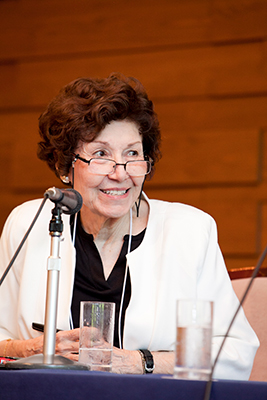Voices from the World
Prof. Barbara Ruch
Director & Professor Emerita, Institute for Medieval Japanese Studies, Columbia University

As Toshiba International Foundation (TIFO) enters its 30th year, it is an honor to be allowed here to present words of congratulation in this public way. Even more than words of congratulation, however, I want to offer words of praise and profound gratitude. Japan is a country that should be proud to be home to such a pioneering, innovative and globally effective Foundation.
It is widely recognized that Japan invests very little in nurturing the flowering of Japan’s great cultural achievements among non-Japanese abroad. This is conspicuous compared to its neighbors or the European countries whose cultures Japan lionizes (such as France and England). Initiatives by the private sector and Japanese corporations, therefore, become all the more important in taking up the resulting challenge to assure that Japan is understood and appreciated on a broad and deep human level beyond the marketplace.
In the 1980s, American laborers were seen smashing automobiles made in Japan. This was reported globally by the media with shocking photographs. These ordinary American knew nothing about Japan, that small country of islands floating far away in the Pacific. They saw Japan only as a nation whose mission was to win a world economic race and whose greatest pride was as manufacturer and marketer. Toshiba Corporation, with courage and great insight, responded by creating a Foundation (TIFO) whose mission was to counter such ignorance and make Japan whole again in the eyes of the world.
Five years ago in celebration of TIFO’s 25th anniversary I wrote the following words which bear repeating here because, to my mind, they express the unique essence of Toshiba International Foundation:
The English word "foundation" and the Japanese word zaidan have somewhat different resonances. When I think zaidan, I think only “finance.” The English word “foundation” is much broader and has the architectural nuance of “a stable and secure base from which to build.” It also has the philosophical nuance of “basic, or essential.” In short, “that on which all else is built; that from which all else rises.
To me Toshiba International Foundation fits perfectly this English nuance.
TIFO steadily built support for Columbia’s precedent-breaking Gagaku-Hōgaku ensemble training. It was then an honor for us to hold a culminating Tokyo Summit on Japanese Heritage Music in the 21st Century – Recommendations for the Future in 2014. This collaborative event, part of the celebration of TIFO’s 25th anniversary, was especially characteristic of TIFO. It was not just one more symposium of talk by intellectuals. It was a meeting of experts who, then and there, created action groups to improve Japanese heritage instrument training on the university level; support Japanese music teaching in K-12 Japanese schools; strategize on technological innovations for instrumental component parts such as ivory, reeds, skins, special woods, etc., critically endangered by legal or ecological factors. These natural next-level steps followed the New York Summit and built upon the stable base being created by TIFO.
Innovation and leadership have consistently been the hallmarks of TIFO’s cultural policies. Their new program to bring exciting young musicians of Western heritage to a yearly Global Artist Residency in Tokyo to master Japanese instruments is another example of TIFO’s taking strategic action in developing cultural leaders in many countries – whose influence will, without a doubt, change international attitudes, and enhance the image of Japan culturally outside the Japanese language speaking world.
All of Japan should be grateful to have such a Foundation at work, as indeed we abroad already are. May TIFO’s next 30 years be as innovative and influential as these past 30 years have been.

東芝国際交流財団(TIFO)が創立30周年を迎えられるにあたり、このような形でお祝いの言葉を述べることができ光栄に思います。 しかし、祝辞以上に、私は賞賛と深い感謝の意を表したいと思います。このように世界で活躍する先駆的で革新的な財団が存在することを日本は誇りに思うべきでしょう。
海外の人々の間では、日本の素晴らしい文化を育み広めていくことに対して日本がほとんど投資していないことは広く認識されています。この事は、近隣諸国や日本がその文化を賞賛してきたヨーロッパ諸国(フランス、イギリスなど)と比べると一層際立ってみえます。だからこそ、こうした公的投資の限界という問題を克服しつつ、日本が単に市場というものを超えて広く深く人間的なレベルできちんと理解され評価されるために、民間の団体や企業による支援活動が益々重要なものとなっています。
1980年代、アメリカの労働者たちによって日本製の自動車を破壊する衝撃的な光景がメディアによって世界的に報道されました。一般的なアメリカ人は、太平洋の遠くに浮かぶ小さな島国である日本について何も知りませんでした。彼らは、日本が目指しているのは、世界経済の競争を勝ち抜くことであり、その最大の誇りが製造業もしくは販売業である国、としてしか日本を見ていませんでした。そのような無知に立ち向かい、より包括的な日本の姿を世界に知らしめるべく、東芝は勇気と深い洞察力をもって財団(TIFO)を創設したのでした。
5年前、TIFOの25周年に際して、私は次のようなことを書きました:
英語の「foundation」と日本語の「財団」は、若干異なる意味を持っているように思われます。日本語で言うところの「財団」には、ややもすると、「ファイナンス」の意味合いがあるのに対し、「foundation」はもっと幅広い意味を持ち、何かを築くための「磐石な礎石」という構造的なニュアンスを持っています。更に「基本」や「本質」と言った哲学的な含みもあります。要するに、「あらゆるものがその上に構築され」、「あらゆるものがそこから派生する」ということです。
私にとってのTIFOは、まさに英語で言うところの「foundation」が似つかわしいのではないかと思います。
コロンビア大学の雅楽・邦楽アンサンブル実技レッスンは前例のない講座ですが、TIFOからの地道な支援によって益々充実したものになりました。 TIFOの25周年記念式典の一部として2014年に開催した「21世紀における日本音楽-未来への提言-」と題したこのコラボレーションイベントは、TIFOのそうした特長を体現したものでしたが、これは知識人によるありきたりのシンポジウムではありませんでした。当時の専門家によるこのサミットがきっかけとなり、大学レベルでの日本の伝統的な楽器の訓練の環境を改善するためのチームが形成され、小中学校では日本の音楽教育を応援する取り組みが始まり、象牙、葦、皮、特殊な木材など法的、もしくは環境問題から存続の危機にある様々な楽器部品原材料の技術革新を戦略的に推進する取り組みへと発展していったのです。前年に開催されたニューヨークでのサミットに続くもので、TIFOによって築かれた基盤があってこそ実現したことでした。
イノベーションとリーダーシップ-この2語が、TIFOの文化支援に一貫した方針といえましょう。将来影響力をもつと思われる西洋の若い音楽家を毎年東京で開催されるグローバル・アーティスト・レジデンシー制度に招き、和楽器を習得させる新しいプログラムは、TIFOが多くの国の文化的指導者の育成に戦略的な一歩を踏み出した事例です。日本語圏以外の世界で日本の文化のイメージを確実に高めることが期待出来ます。
私たち海外で活動する団体はもちろんのこと、日本全体がTIFOのような財団が存在し活躍していることに感謝しなくてはなりません。TIFOの次の30年間が、この30年間と同じくらいに革新的で影響力の持つものとなることを祈念しています。

